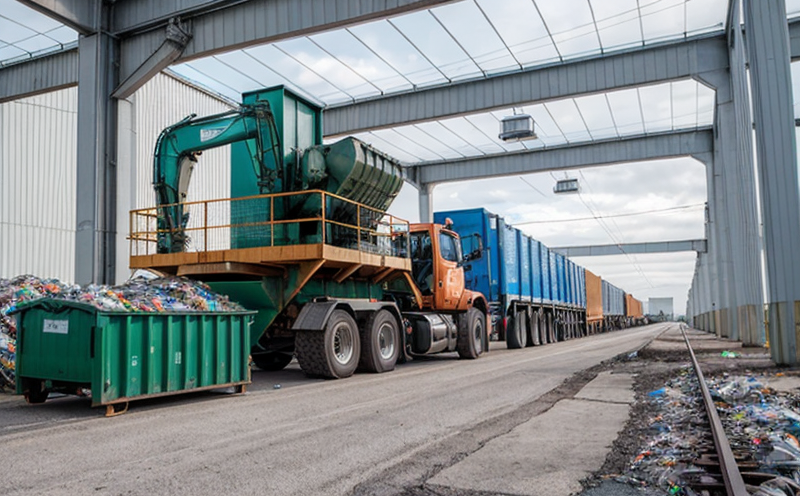ASTM D8182 Battery Recycling Process Testing
The ASTM D8182 standard is pivotal in ensuring that battery recycling processes meet stringent environmental and safety standards. This service focuses on evaluating the effectiveness of various recycling methods, including mechanical and hydrometallurgical techniques, to recover valuable materials from spent batteries.
Recycling batteries is crucial for several reasons: it reduces the demand for raw materials, conserves natural resources, decreases landfill waste, and minimizes environmental pollution. The process involves a series of steps that must be meticulously monitored to ensure efficiency and sustainability. ASTM D8182 provides detailed guidelines on how these processes should be conducted and evaluated.
The testing protocol outlined in ASTM D8182 is designed for the following types of batteries: lithium-ion, nickel-cadmium (NiCd), nickel-metal hydride (NiMH), lead-acid, and others. The standard emphasizes the importance of minimizing energy consumption during recycling processes while ensuring that all necessary materials are recovered.
Before starting the ASTM D8182 testing, it is essential to prepare the samples correctly. This involves disassembly of the batteries to separate the various components. Once separated, these components undergo a series of tests to evaluate their condition and suitability for recycling. The tests include visual inspection, density measurement, and chemical analysis.
The primary objective of ASTM D8182 is to ensure that the recycled materials meet the quality standards set by international standards such as ISO 9001:2015 and EN 13432. These standards guarantee that the recycled materials are safe for use in new products, thus promoting a circular economy.
The testing process itself involves several key steps:
- Initial assessment of battery components
- Disassembly to separate different materials
- Testing of each component individually
- Evaluation of the recycling process efficiency
The results from these tests are used to determine whether the recycled materials can be reused in new products. This ensures that the circular economy principles are upheld, and valuable resources are not wasted.
Recycling batteries is essential for environmental sustainability. By reusing existing materials, we reduce the need for mining new raw materials, which has a significant impact on the environment. For instance, lithium-ion battery recycling can help conserve natural resources by reducing the demand for lithium, cobalt, and nickel.
The ASTM D8182 testing process also helps in identifying potential improvements in the recycling process. By evaluating each step of the process, we can pinpoint areas where efficiency could be increased or waste reduced. This is crucial for both environmental and economic reasons.
In conclusion, ASTM D8182 Battery Recycling Process Testing plays a vital role in ensuring that battery recycling processes are environmentally friendly and efficient. It helps in promoting sustainability by minimizing waste and conserving resources. By adhering to the strict guidelines set forth by this standard, we can contribute significantly to environmental protection.
Industry Applications
- Battery manufacturers looking to ensure compliance with international standards
- R&D departments seeking to optimize recycling processes
- Environmental agencies monitoring the impact of battery recycling on ecosystems
- Recycling companies focusing on improving efficiency and reducing waste
The ASTM D8182 testing process is particularly beneficial for R&D departments. By using this standard, they can develop new methods that improve the effectiveness of battery recycling processes. This not only helps in recovering more valuable materials but also reduces the environmental impact of recycling.
Environmental agencies can also leverage ASTM D8182 to monitor the performance of different recycling companies. By comparing the results from various tests, they can identify best practices and areas for improvement. This information is crucial for enforcing regulations and promoting sustainable practices across the industry.
Customer Impact and Satisfaction
- Increased customer satisfaction through the provision of high-quality recycled materials
- Enhanced reputation as a trusted provider of environmental solutions
- Promotion of circular economy principles, leading to long-term business sustainability
The ASTM D8182 testing process has a direct impact on customer satisfaction. By ensuring that the recycled materials meet the highest quality standards, we provide our customers with products they can trust. This is particularly important for companies in industries such as electronics and automotive, where material quality directly affects product performance.
Our commitment to sustainability through ASTM D8182 testing also enhances our reputation as a trusted provider of environmental solutions. This positive image attracts more customers and contributes to long-term business success. By promoting circular economy principles, we contribute to the overall health of the environment, which is crucial for future generations.
Environmental and Sustainability Contributions
The ASTM D8182 Battery Recycling Process Testing plays a significant role in environmental protection by reducing waste and conserving resources. By recycling batteries efficiently, we minimize the need for mining new raw materials, which has a considerable impact on the environment.
Mining these materials can lead to habitat destruction, water pollution, and other forms of environmental degradation. Recycling batteries through ASTM D8182 ensures that these negative impacts are minimized. For instance, recycling lithium-ion batteries reduces the demand for lithium, which is often extracted from environmentally sensitive areas such as South America.
The standard also promotes energy efficiency in battery recycling processes. By minimizing energy consumption during the recycling process, we contribute to reducing greenhouse gas emissions and promoting sustainable practices. This aligns with global efforts to combat climate change and achieve carbon neutrality by 2050.
In addition to its environmental benefits, ASTM D8182 also supports the circular economy principles. By recovering valuable materials from spent batteries, we ensure that these resources are reused in new products. This not only conserves natural resources but also reduces waste sent to landfills, which is a significant source of pollution.





